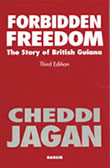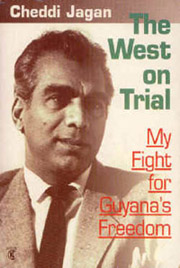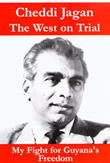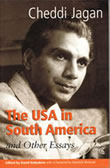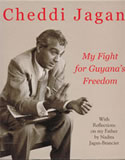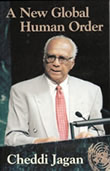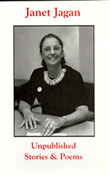Book Reviews of Books Written by The Jagan's
Forbidden Freedom by Cheddi Jagan
In 1953, after only 133 days in office, Dr. Jagan’s government was deposed by the British colonialists. This book, Forbidden Freedom - Story of British Guiana first published in 1954 (while Dr. Jagan was in prison) appeared in the aftermath of that military intervention. He showed how this fitted in to both the colonial policy of Britain and the “Cold War” spearheaded by the United States. It includes an analysis of: ”Labour and the Colonies” and shows who are the genuine and who are the false democrats.
In the original epilogue, chapter 12 in this third edition, Dr. Jagan predicts the later split in the PPP “along ideological and racial lines.”
The second edition, published in 1989, included a new preface by the author, calling for a break in the policies that he notes are leading both the developed and developing worlds towards disaster.
Guyana returned to democracy on October 5, 1992 and Cheddi Jagan became the first democratically elected president. He was sworn in on October 9, 1992 exactly 39 years after he had been forcibly removed from office on October 9, 1953.
The new epilogue (written in 1993) is the last chapter in this new edition and is laden with his ideas and plans for a new Guyana and its people.
All profits from the sale of this book will be donated to the Cheddi Jagan Research Center.
The West on Trial by Cheddi Jagan
Reviewed by Krishna Persaud
The long-awaited and much-anticipated reprint of Cheddi Jagan's autobiographical work "The West on Trial: My Fight for Guyana's Freedom" has finally hit the bookshelves. It is a monumental study of the social, political and economic history of Guyana from the time of European colonization to 1964, when it was first published. There is an additional epilogue in the latest edition released in 1997.
Although Dr Jagan has written voluminously, "The West on Trial" remains his most enduring work, and it is his political testament. It is the unrivalled and definitive study of Guyana's fight for self-determination, against overwhelming odds. But it is also an invaluable resource for students of Guyana's early history. The rivalry among the Dutch, French and British for control of the territory is chronicled with the flair and intellectual rigour of a consummate historian.
Included in the early part of the book is a vignette of plantation life, providing a snapshot of its vicissitudes and privations, which no doubt occasioned the early stirrings of protest and resistance which eventually led to Cheddi Jagan's challenge to the British for the right of Guyanese to be masters of their own destiny.
It also captures the atmosphere, tone and tenor of the early postwar years, with the excitement and sense of impending change being palpable. Its sweep spans a time when legendary and well-known figures graced, or blighted, the political landscape. Hubert Nathaniel Critchlow, Frederick J. Seaford and Colonial Treasurer Frank McDavid were part of the gallery of heroes and villains who had an impact, adversely or not, on Guyanese history. It is part of the considerable appeal of this study that we are given a glimpse of rare moments in Guyanese history. We can almost see the cynical smile on McDavid's face as he swaggered out of the legislature during a speech by the young Cheddi Jagan.
It is precisely this attitude and the motives which undergirded it, that identified the early struggle, for Cheddi Jagan, as one in which the historical imperative consisted of breaking the grip of the planters and the Chamber of Commerce, on the economy and the legislature. Moreover, these circumstances gave rise to the need for a political party which was faithful to the emerging creed of "political unionism".
While Cheddi Jagan accurately gauged the configuration of historical and social forces which were transforming Guyana, his analysis of the impact that World War Two had on the international system indicated a firm grasp of the circumstances which gave rise to the postwar world, Guyana included. However, the main thrust of the book centres on the political events which spanned the 1940s, 1950s, and the early to mid-60s, with these decades being the most pivotal years in Guyana's history.
The major portion of the study therefore, concerns itself with the efforts of British and American governments to harass and destabilize Cheddi Jagan's government. The suspension of the Waddington Constitution in 1953, the machinations against the PPP governments formed in 1957 and 1961, the riot in February, 1962 and the refusal of British forces to aid the civil power, the opposition inspired strikes of 1963 and C.I.A support for them, the hair-raising accounts of the internecine violence, Forbes Burnham's unbridled campaign for power at any cost and proportional representation as the plan hatched to attain it, Kennedy's fear of another "Cuba" in Latin America, and Harold MacMillan's eagerness to assist Kennedy, are all meticulously documented and situated in their respective contexts.
It is probably no accident that the book was named "The West on Trial". It indicts the West, as well as the opportunist Burnham and the comprador d'Aguiar as willing and able accomplices who subscribed to their nation's demise.
The epilogue of the current edition includes a virtual manifesto of policies which the PPP/Civic government will pursue. The ideas advanced are enlightened and far-reaching, and of course are guided by the principles that promote social justice, which is the overarching concern of this comprehensive study. And it is in this spirit of fostering social justice that Cheddi Jagan has outlined his proposal for a New Global Human Order to remedy the inequities occasioned by the present neo-colonial order.
"The West on Trial" is compulsory reading for any student of Guyanese politics, the decolonialization process and the Cold War. The scholarship and prescience evident in the reportage and analysis of the momentous events which the study addresses, ensure that it will have a place of honour among the autobiographies of twentieth-century giants.
Cheddi Jagan has placed The West on Trial for offences committed against the people of Guyana. The case for the prosecution is compelling. There are few mitigating circumstances. The reader, and history, will render their verdicts.
All profits from the sale of this book will be donated to the Cheddi Jagan Research Center.
The West on Trial - Book Review - The story of a great man and his fight for a free Guyana
by Kellawan Lall
Kellawan Lall, Adviser to the President, reviewed Dr Cheddi Jagan's classic book "The West on Trial" which went into its 6th edition, at the Cheddi Jagan Research Centre on November 25, 2004.
Chairman of the book launching was Mr Geoffrey Da Silva, CEO of Go-Invest and a member of the Committee of Management of the Cheddi Jagan Research Centre.
Below is Mr Lall's address in full:
The West on Trial written by Dr Cheddi Jagan was first published in 1996. Since then it has been reprinted several times by different publishing houses. Today, we have the sixth edition by Harpy publishers of Canada.
Over the years, The West on Trial has changed its form. The front cover of the original version differs from others, including this 6th edition. There have been several epilogues, the last one having been completed in 1997 and first published by Hansib Caribbean publishers in the same year. This sixth edition has some notable inclusions, some recent photographs and a new preface by Mrs Janet Jagan. An important inclusion, which the casual reader may fail to notice, is the small announcement that the proceeds of the sale of this edition will be donated to the Cheddi Jagan Research Centre. Perhaps in years to come, we will fully understand the significance of this little note.
The list of other publications by the author, which was included in the 1997 Hansib edition, is also in this one. Dr Jagan would have been pleased with the editors, Mrs Nadira-Jagan Brancier and Mr Krishna Persaud, who have done an excellent job.
I must also acknowledge the leading force behind the persistent efforts to keep the writings and works of Dr Jagan alive. That person is here with us. I want you to join me in giving full honours to Mrs Janet Jagan.
The West on Trial has always been printed in the thousands and every time the demand keeps growing. It has been reviewed by hundreds of people in many countries and in several languages. And it is not uncommon to see excerpts of, and references to, The West on Trial in current writings.
Most Authentic
This autobiographical work, written almost four decades ago, remains one of the most authentic and graphic depictions of a very important period of our history. Although there is a brief chapter on Guyana's history that summed up the centuries of colonial rule, slavery and Indentureship, its real essence lies in Dr Jagan's detailed portrayal of an unfolding new stage of our history beginning with the upsurge of the mass movement in the forties for independence. His entry into politics coincided with that period and as events would later show, he immersed himself into this growing momentum to the extent that he became the symbol of the struggle to remove the British.
And so today, The West on Trial has become not only a story of a great man and his fight for a free Guyana, but a reference point for all those who want to understand the fullness of the struggle of the time and how one man together with the masses took hold of history and guided it in a purposeful manner to become the tool of the masses. In many ways, The West on Trial, or the life of Cheddi Jagan, which is about the same thing, is a case study of how the masses made history.
Perhaps the colonial and imperialist powers together with home grown lackeys never understood or failed to accept the notion that ordinary people could fathom or even appreciate the meaning of freedom and independence. While history has shown that the masses do make history, it is also true that imperial powers have never and would never accept this reality.
Cannot stop tide of history
It was Dr Jagan's strongest position. It was this message he was trying to get over to the colonialists and people here and abroad, where the movement for independence was at its zenith. He was telling us that everywhere, including in Guyana, you cannot stop the tide of history. It was this optimism that kept him going and explains his monumental struggles, sometimes single-handedly, against some of the mightiest powers on earth.
Even to the end, he believed in this. At the time of his death, when the Soviet Union and the world socialist system had collapsed, and when there was one dominant superpower and one dominant world economic system, he held on to this view. When prophets of doom and the exponents of the theory that the end of history was here, Dr Jagan in 1997, in his last epilogue to The West on Trial wrote that "only with mass struggles and the maturing of all factors - political, economic, cultural and institutional, will fundamental changes take place."
He had faith in people. And the people had faith in him. Not so much so because they understand his world outlook and all the intricacies of politics. This symbiotic relationship existed because, in a very deep sense, the people wanted change and drastic change at that. That is why he tells us in The West on Trial that in his early political experience that the existing groups such as the East Indian Association and the League of Coloured People, never made an impact. They wanted only superficial changes. He probably knew that the people had already condemned the West, seeing the West as the reason for their down-trodden state. He did not have to put the question whether the West was on trial. The answer was already there. And he reflected that in his book, the West was already on trial and he knew what would have been the verdict. Remember his famous words: "History and time are on our side."
I am sure that there are many stories in real life to amplify this saga which still seems mysterious to some.
Learning about Jagan
At the time of the writing of The West on Trial, which was about the time we gained our independence, I was just a teenager in a remote East Canje village with a Dutch name - Goed Bananen Land. Interestingly, there were no bananas around, just sugar cane. I was never attuned to the politics of the day, although as a child I felt an air of hope among the elders. There was always talk, sometimes hushed, sometimes deafening, at public meetings, of Jagan, GAWU and strikes. I understood the strike part somewhat because my father at times was not working and we lived off the meager rations I sometimes collected from a bottom house distributed by union people. That same building in nearby Adelphi was the scene of a bomb that killed the man who planted it. The word was that the bomb was intended for Philomena Sahoye, who was indeed a fireball to us on the sugar estate, and Victor Downer of the PPP a few days earlier, a bomb had blown apart a silk cotton tree in another village called Gangaram from where came one of Canje's early women stalwarts, Arai Tantoni.
The first time I heard about The West on Trial was from my father during a usual gaff session at my home. During the discussion I heard one of them, in Canjeite creolese say that "dat man Jagan writing about us and the manga now go know wha we stand fuh."
At the time I never understood what they were talking about. And I am sure they never saw nor read the book. At least I knew my father never had the book. Only years later he was to purchase one but never read it. He would, however, every now and then pick it up and with pride show it to his friends that he had one. It was indeed a prized possession especially since we really couldn't afford it.
It was only after some reflection on my part some time later, I got to understand what was happening. For ages the workers on the sugar plantation had a limited horizon. The estate was their life and death. You lived by the estate whistle. By that whistle you wake up in the morning, you go to bed, work, the cinema... You aspire to work on the estate some day. You dream of finishing school and hope one day to be a big one, which could be either a clerk in the main office building or a supervisor.
That was the world in which the workers were locked. Their lives were meaningless. It was all work and a little recreation at the village rum shop or drinking bush rum at the backdam.
People became more self confident
And so when Dr Jagan came on the scene and later wrote his book, people began to see themselves differently and became more self-confident. Dr Jagan had put them at the center of his world - a world where there was freedom and freedom from want. It was the first time they got that feeling of not just being a statistic and a poor canecutter or rice farmer. Dr Jagan had now put them on a pedestal and allowed them to see themselves as human beings who can be masters of their destiny.
It was this sense of hope that as a young man I saw around me. And that is what I consider to be the most lasting impact of The West on Trial. The masses did not have to read it. They knew that this man Jagan for the first time in history saw them as people, went into their shabby homes, ate their plain foods and forever wearing his trade mark smile, and put them as the main players in a book that was being read not only in Guyana but overseas.
My own experience
I mention my own little experiences to point out that The West on Trial is not only a book. Dr Jagan was a propagandist, a teacher and an organizer. He used the West on Trial not only to tell of his struggles and the story of the fight for Guyana's freedom. Dr Jagan successfully used it to bring the masses together to struggle with him. More than any other politician or public figure, he removed the mental shackles that kept the people in mental slavery. But that was only to get them to be involved in the struggle.
The West on Trial will continue to stand as a permanent monument to Dr Jagan. It will always be there for generations to witness that he had a vision of Guyana and the world that would become a reality. His last epilogue, in which he called for a New Global Human Order, will be there as a manifesto to further struggles.
I have had the honour and privilege to work with Dr Jagan for years, especially between 1992 and 1997 when he became the first democratically-elected President of Guyana. I have seen and in little ways assisted him, in putting together his thesis on a New Global Order. He was always searching for answers to Guyana's and the world's problems. At the back of his mind were the national interest of Guyana and the well being of the Guyanese people. The ideas in the New Global Human Order were intended to create a world in which a poor developing country like Guyana can have a chance of surviving. His primary goal, however, as was his goal in writing The West on Trial was to put the working man on top of that world.
All profits from the sale of this book will be donated to the Cheddi Jagan Research Center.
The USA in South America by Cheddi Jagan
As Dr Havelock Brewster has observed in his foreword, the papers comprising "The USA in South America, and other essays" are very much a product of their time, and it is in this context that they should be read.
This captivating study of Guyana and the international arena consists of five papers in the form of chapters, and a letter to President Kennedy written by Premier Jagan in 1963. The first and fifth papers are based on Guyana, the second on the Non-aligned Movement, the third on the Caribbean and Central America, and the fourth (and most intellectually engaging) on the theory of vital interests and security zones. The essays provide a perspective on Latin America and superpower relations viewed through a Marxist prism.
They were written between 1968 and 1986, when the Cold War raged with great ferocity internationally, and the long-suffering people of Guyana endured Forbes Burnham's despotism, economic mismanagement and electoral fraud. And quite appropriately, these essays were situated within the context of the American vice grip on their backyard, Latin America, and Burnham's opportunism in exploiting American fear and antipathy towards the possible return of a government led by Cheddi Jagan.
The permutations of U.S foreign policy, based on the worldview of successive American Presidents, is analysed and dissected within the context of the American desire to, in essence, make the world safe for capitalism.
The two decades on which the papers are based were eventful. They encompassed a time of great upheaval in Latin America. Salvador Allende's government in Chile was overthrown, the Sandinistas were under the gun from Reagan-funded mercenaries, Maurice Bishop was assassinated in Grenada, the liberation struggle in El Salvador was stalemated due to American intervention, as it was in Guyana.
Dr Jagan's grasp of these, and other regional and international issues, and the intellectual depth and emotive power he communicated in his writings, will engage any reader. This book is vintage Cheddi Jagan.
All profits from the sale of this book will be donated to the Cheddi Jagan Research Center.
Cheddi Jagan: My Fight for Guyana's Freedom.
Reflections on her father by Nadira Jagan-Brancier
Reviewed by Krishna Persaud
In his book The Middle Passage, V.S. Naipaul wrote: "After dinner Dr Jagan's mother showed me the photograph album. It had been extensively rifled. The only photograph of interest was one Dr Jagan had sent back from America while he was a student. A studio portrait by an unimaginative photographer of a dazzlingly handsome young man looking over his shoulder, not unaware of his looks."The reader will find that photograph on page 28 of Cheddi Jagan: My Fight for Guyana's Freedom, compiled and annotated by Nadira Jagan-Brancier.
The publication consists of over 350 photographs in juxtaposition with text from the antecedent volume, The West on Trial, that definitive study of Guyanese politics written by the author's father.In essence, this is a photographic biography, depicting the life and times of Cheddi Jagan. It is a handsome, well-bound book, in hardcover, with a striking photograph of a young and sartorially splendid Cheddi Jagan on the dust jacket, which contains a synopsis of both The West on Trial and Cheddi Jagan, My Fight for Guyana's Freedom, written by Dr Odeen Ishmael, Guyana's ambassador to The United States.
The author, in her introduction, wrote that she had tried on many occasions to get her father to write a more personal autobiography. His response was that he had already done so in The West on Trial.
In Ms Jagan-Brancier's words, her book "allows the reader a closer and more intimate look into my father's life... Photographs tell a story all by themselves!... and my wish was to share my father's life with everyone."
Guyana owes Nadira Jagan-Brancier a debt of gratitude, because she has so generously chosen to share these rare and hitherto private photographs and moments with us. Time will not diminish Cheddi Jagan's stature.
On the contrary, time will enhance it. And with the passage of time, one envisages that this work will be regarded as a family heirloom, and will be handed down from generation to generation.
For those born in the early postwar years, it will be a retrospective on those momentous events which gripped and absorbed the nation, and gave the occupants of the White House and Whitehall, anxious moments.
And for their children, it will help to explain the events which so inflamed the passions of their parents.
These photographs and the accompanying text, represent the odyssey of Dr Jagan's life, a life of epic proportions. They portray triumph, glory, (though it was unsolicited), betrayal, success and finally, vindication. This new genre, text wrapped around photographs, is admirably suited to the formidable task of giving substance, shape, form, as it were, to the events and personalities that spanned half-a-century.
The pages of this riveting volume are graced with photographs of Cheddi Jagan in the company of world leaders, among whom are Pope John Paul II, Jawaharlal Nehru, Julius Nyerere, Kwame Nkrumah, Fidel Castro, John Kennedy, U Thant, Indira Gandhi, and Queen Elizabeth II, to mention a few. And there is previously unpublished correspondence between Dr Jagan and other well-known figures, among whom are former British Prime Minister Harold Wilson and the great baritone and actor Paul Robeson, the latter being Dr Jagan's friend.
And it should be added that the reader will be privy to a poem written by Cheddi Jagan when he was in prison, the only one he was known to write.
Moreover, in the absence of television reportage in Guyana in the fifties, sixties, seventies and early eighties, these photographs are a valuable record of the other Guyanese personalities who were part of our political landscape. Among others, there are pictures of Forbes Burnham, Peter d'Aguiar, Sidney King, Walter Rodney, Rupert Roopnarine and Brindley Benn, who once served as deputy premier.
But Dr Jagan was also a devoted family man, and there are shots of his wife, now President Janet Jagan, their children and grandchildren, as well as Dr Jagan's siblings and parents.
And while these photographs generate great interest, one suspects that the reader will keep returning to the text of, The West on Trial, which has great appeal in its own right. The concept of the ideal man, liberal and intellectual in outlook, flawess and unassailable in character, and indomitable in spirit, found its apogee in Cheddi Jagan. And the great strength and charm of this book lies in its ability to portray the grace, dignity and fullness of his life.
We are indeed very fortunate that we have been given the chance to have such a personal glimpse of the man who has left such an indelible impression on the Guyanese psyche. The pictures chosen by Nadira Jagan-Brancier for her book, have helped to define her father's irreducible and essential humanity. This collection of photographs represent more than the miracle of light and shadow, more than looking through the glass darkly with a passionate eye, they constitute a work of art. But more than anything else, they are a labour of love.
All profits from the sale of this book will be donated to the Cheddi Jagan Research Center.
A New Global Human Order by Cheddi Jagan
Book Review by Krishna Persaud
Edited by Janet Jagan with a foreword by Clement Rohee
Publisher: Harpy; Pages: 110; Price: $12.00 (Can)"A New Global Human Order" is the culmination of Dr. Cheddi Jagan's lifelong quest to redress the balance between the rich North and the poor South. In the early postwar years and during the Cold War, the crucial issues were political independence for the British, French, Dutch, Belgian and Portuguese colonies and the hegemonic role played by the United States, particularly in Latin America. Guyana was doubly caught in this vortex of oppression, given its position as a British colony and being in the U.S sphere of influence, and this crucible may have been instrumental in inspiring Dr. Jagan to articulate a response.
The situation is now markedly different with the collapse of the European empires and the end of the Cold War. Today, the injustice lies in the inequitable terms of trade, the debt trap and concomitantly, the vicious cycle of poverty in which developing countries are caught. "A New Global Human Order" represents Dr. Jagan's response to these pressing issues of our time. It is a compendium of his speeches at regional and international fora, and his correspondences with world leaders and leaders of international financial institutions.
With characteristic astuteness, Dr. Jagan saw an opportunity to redress the balance between the North and the South to the mutual benefit of both. The end of the Cold War has made possible a "peace dividend", which, along with his proposals for pollution taxes and the Tobin Tax to dampen currency speculation, and a work week reduced to thirty-five hours (without loss of pay, to reduce unemployment in the North), will allow the South to be given aid "in the form of debt cancellation, long-term rescheduling of debt, and soft loans and grants," thus adding to their human development potential.
At the heart of the unjust and inhumane international system, fossilized in North Atlantic primacy after the Second World War, are the international terms of trade and the debt trap. Dr. Jagan addressed both by issuing a call for "fair trade", and a balanced approach to debt servicing. He pointed out a fact that bankers and statesmen are privy to in the West, that the net outflow of capital from South to North is greater than the flow from North to South, as is popularly believed.
While some facts contained in the book invite moral outrage, the ideas advanced to humanize the international system are severely practical and workable. Most importantly, their implementation would benefit both North and South, in terms of suppressing the drug trade, placing less stress on the environment, reducing alienation, unemployment and poverty, and creating a more vibrant, expanded and sound international economic system, based on mutual and enlightened self-interest. And it is in the latter that the genius of these ideas is derived. A better world is created while the North and the South pursue their own interests, in "interdependence, cooperation and partnership".
Moreover, there is evidence that the concept of a New Global Human Order is gaining momentum. The meeting of finance ministers of the Association of Southeast Asian Nations, convened in March 1999, has recommended that changes be made to the international financial structure, including the monitoring of currency speculation. And prior to this, in September 1998, the Group of 77, chaired by Guyana, advanced support for changes to the world financial system. In this regard, the "Tobin Tax" would serve the dual purpose of dampening currency speculation, while raising US$150 billion dollars per year to finance human development, without which, Dr. Jagan reminded us, there could be no economic development. And the Paris Club, which facilitates debt reduction, has suggested that when the Group of Eight leaders meet in June 1999, they will make a major announcement on the matter.
In 1994, Pope John Paul II, as a result of his reflections on the millenium, declared the year 2000 to be a Year of Jubillee, a concept which has its roots in the Old Testament practice of debt forgiveness every fifty years. This "Jubilee Initiative", supported and organized by the Catholic and Protestant Churches, are lobbying governments in the North to substantially reduce the debt owed by fifty of the most indebted countries of the world, with Guyana being on the list.
In essence, Dr. Jagan has shown us that "human development, as distinct from the means of development, positing human beings at the centre of our deliberations" should be our guiding principle. And by his work and his thought, he has set in motion a series of events which could well make his lofty ideals a reality. This volume is a fitting tribute to the life, legacy and promise of this great humanitarian.
All profits from the sale of this book will be donated to the Cheddi Jagan Research Center.
Olver urges 'robust debate' on New Global Human Order - at launching of Dr Jagan's book
By Linda Rutherford
UNITED Nations resident representative, Mr Richard Olver is urging "a robust debate" on the dissimilar, but people-oriented concepts of human development and the late Dr Cheddi Jagan's `New Global Human Order (NGHO)', with a view to forging a nexus.
The former concept is the brainchild of United Nations Development Programme (UNDP) advisor on human development issues and founder of the agency's Human Development Report, the late Dr Mahbub ul Haq.
"We should conduct a robust debate on the two sets of concepts; we should look at their differences; we should test their assumptions; we can all benefit by that process," Olver proposed.
He issued the challenge late Monday afternoon at the launching of a paperback version of the collective speeches that comprise `Dr Jagan: A New Global Human Order', at the Foreign Service Institute, New Garden and Charlotte Streets, Georgetown.
The event, one of five to mark, albeit posthumously, the 81st birth anniversary of the late President, was attended by several delegates who convened here for the fourth Caribbean Community and Central American foreign ministers' meeting and government ministers and members of the diplomatic corps.
It was also attended by Dr Jagan's widow, President Janet Jagan, whose brief presentation mainly centred around fond memories of her late husband. It was chaired by Mr Lloyd Searwar.
The definitive difference between the two concepts, according to Olver, is that one focuses on systems for global equity and the other on balance with growth. But, disparity notwithstanding, he said, they have a common goal - "putting people first."
Another unifying factor, he said, is that both concepts raise the tough questions "that go unasked, again and again, in global fora in decision-making bodies around the world," such as - whose interest comes first, profit, or people?
Without people, Olver argues, "there is no meaning, no purpose for economic development."
Noting that this was something which, "unfortunately, gets lost again and again because of the imperatives of wealth creation, Olver said "it requires a Dr Jagan; it requires a Dr ul Haq....to reopen the question in every generation; to put the focus back where it belongs."
He said too, that despite the fact that "there are racists in this world...those who seek economic hegemony [and] those who put narrow interests against the good of humanity as a whole, [they] must support each other; must listen to each other; must find ways to work with each other in alliances for human development".
Olver added, "... it is only through support to putting people first, by whichever means prevails in these debates, that we will create a world that realises the vision of Dr Jagan and Dr ul Haq".
Foreign Affairs Minister, Mr Clement Rohee who also made a brief presentation, observed that as a consequence of the global financial crises engulfing such countries as those in the Far East and Russia and Brazil, many world leaders have now come to realise that the present financial and monetary arrangements obtaining worldwide are not only untenable, but unreliable and unpredictable.
The resultant clamour for change, he said, has been reinforced "in no uncertain terms" at the recently concluded world economic forum at Davos, Switzerland.
There is too, he said, a growing awareness that the present development paradigm to which the majority of the developing countries are committed is no longer viable nor acceptable and, therefore, the need for change.
Given that the Guyana Government holds the view that this need for change in both the North and South should be based on genuine partnership, mutual understanding and collective self interest of both sides, Rohee said "herein lies the efficacy of the call for a NGHO.
"No pipe dream" this "as some are wont to make believe," Rohee said: "It is the way forward; it is a millennium project; it is the future."
Rohee said the 110-page paperback was the sixth in a series of publications associated with Dr Jagan's NGHO concept and the brainchild of his daughter, Mrs Nadira Jagan-Brancier. The first was in the form of a pamphlet in 1994, he recalled.
Core discussion papers governing the topic have since been published in Spanish, French and Portuguese, courtesy of the Ministry of Foreign Affairs, to facilitate a wider readership and understanding of the concept.
And in April 1996, what has been considered the highpoint, was the convening here of an international conference at which a paper known as `the Georgetown Declaration' was adopted. Since then, Rohee said, the concept has won critical acclaim and acceptance at every major international fora, including CARICOM, the Association of Caribbean States, Organisation of American States and the UN, not to mention the positive responses it has received at the bilateral level.
At the national level, he said, the concept was unanimously adopted by the National Assembly in a motion calling for a global strategy to combat poverty and hunger. And internationally, plans are in train to encourage the establishment worldwide of `Circles of Friends' for the promotion and establishment of NGHO. The objective, Rohee said, is to foster and establish a permanent global network of like-minded persons and organisations supportive of Dr Jagan's idea.
The new publication, which was edited by the President, was published by Harpy's of Ontario, Canada and is being sold locally (in Guyana) at $1200 per copy.
Printed in the Guyana Chronicle.
All profits from the sale of this book will be donated to the Cheddi Jagan Research Center.
Sharing some thoughts with Cde. Janet Jagan
by Mohamed Sattaur
A new book on Cde. Janet Jagan titled “Janet Jagan Unpublished Stories and Poems” was launched at the Cheddi Jagan Research Centre (Red House) on Tuesday, March 23, 2010.
The book, which was edited by Mrs. Nadira Jagan Brancier, daughter of the late Presidents Cheddi and Janet Jagan, is a collection of previously unpublished stories and poems dedicated to freedom fighters, children and the family of Mrs. Jagan.
In a short presentation preceding the book launch, Mrs. Jagan Brancier explained that while Dr. Jagan was known to be a prolific writer, her mother, Janet Jagan, was also very productive and has left a well organized collection of handwritten notes, diary entries, articles and papers which she has been systematically going through much in the same manner that she worked on the documents left by her father.
The book is a compilation broken down into four categories viz “Dedication to Guyana’s Heroes”, “Dedicated to Freedom Fighters”, “Dedicated to Children” and “Dedicated to Family” and presents us with a look into the mind and thoughts of Janet Jagan during the trials and tribulations as well as the happy moments of her varied life.
We thank Cde. Nadira for this work of love on the first death anniversary of our beloved Comrade Janet Jagan and encourage her to continue her efforts to preserve the memory of both of her parents by making such timely interventions. The Book is on sale at the Cheddi Jagan Research Centre and the Michael Ford Bookshop for G$ 1,500.00 per copy. Proceeds of the sale will be donated to the Cheddi Jagan Research Centre.
All profits from the sale of this book will be donated to the Cheddi Jagan Research Center.

